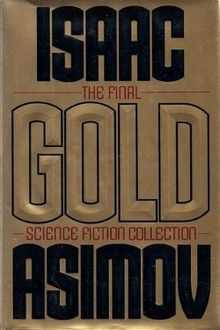Gold (Asimov)
From Wikipedia, the free encyclopedia

First edition (publ. Harper Prism)
Gold: The Final Science Fiction Collection is a 1995 collection of Isaac Asimov's stories and essays. The stories, which comprise its first half, are short pieces which had remained uncollected at the time of Asimov's death. As such, they have been criticized by some as inept or below par—what the writer himself termed "minor Asimov". Likewise, the non-fiction pieces in the book's second half are not generally considered among Asimov's most significant output. Nevertheless, Gold contains some notable works. "Cal" describes a robot that wishes to write, and the title story "Gold" expresses both Asimov's admiration of King Lear and his thoughts on cinema adaptations of his own stories. The story "Gold" won a Hugo Award.
Contents
Part One: The Final Stories
- "Cal"
- "Left to Right"
- "Frustration"
- "Hallucination"
- "The Instability"
- "Alexander the God"
- "In the Canyon"
- "Good-bye to Earth"
- "Battle-Hymn"
- "Feghoot and the Courts"
- "Fault-Intolerant"
- "Kid Brother"
- "The Nations in Space"
- "The Smile of the Chipper"
- "Gold"
Part Two: On Science Fiction
- "The Longest Voyage"
- "Inventing the Universe"
- "Flying Saucers and Science Fiction"
- "Invasion"
- "The Science Fiction Blowgun"
- "The Robot Chronicles"
- "Golden Age Ahead"
- "The All-Human Galaxy"
- "Psychohistory"
- "Science Fiction Series"
- "Survivors"
- "Science Fiction Anthologies"
- "The Influence of Science Fiction"
- "Women and Science Fiction"
- "Religion and Science Fiction"
- "Time-Travel"
Part Three: On Writing Science Fiction
- "Plotting"
- "Metaphor"
- "Ideas"
- "Suspense"
- "Serials"
- "The Name of Our Field"
- "Hints"
- "Writing for Young People"
- "Names"
- "Originality"
- "Book Reviews"
- "What Writers Go Through"
- "Revisions"
- "Irony"
- "Plagiarism"
- "Symbolism"
- "Prediction"
- "Best-Seller"
- "Pseudonyms"
- "Dialog"
References
- Eos paperback edition (2003) ISBN 0-06-055652-8.
External links
- Gold: The Final Science Fiction Collection title listing at the Internet Speculative Fiction Database
| ||||||||
This article is issued from Wikipedia. The text is available under the Creative Commons Attribution/Share Alike; additional terms may apply for the media files.